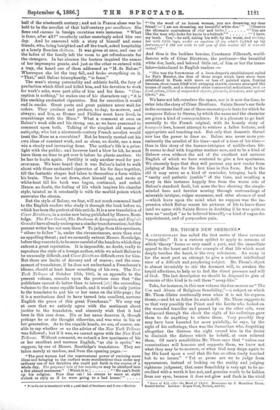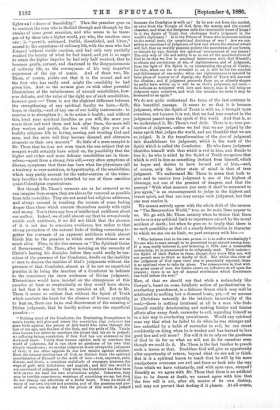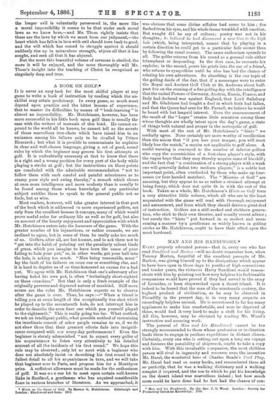MR. THOM'S NEW SERMONS.*
A CONTEMPORARY has called the first series of these sermons "essay-like." It is a curious epithet to apply to sermons of which 'theory' forms so very small a part, and the immediate appeal to the heart and to the example of that life which most deeply touches the heart, is the very substance. An essay is for the most part an attempt to give a coherent intellectual view of a difficult and perplexing subject. Mr. Thom's object is almost invariably to stir the dormant will, to awaken the torpid affections, to help us to feel the direct presence and will of God. The last description we should be disposed to give of sermons of this kind is to call them "essay-like."
Take, for instance, in this new volume the fine sermon on" The Use and Abuse of Religious Sensibility,"-r-a. subject on which Mr. Thom dilates continually even when it is not his express theme,—and let us follow its main drift. Mr. Thom suggests to us that very possibly the Priest and the Levite who looked on the wounded traveller and passed by on the other side, were indisposed through the shock the sight of his sufferings gave them to do anything to relieve them. Very possibly they may have been haunted far more painfully, he says, by the sight of his sufferings, than was the Samaritan who, forgetting altogether the distress the sight caused him in the desire to diminish the distress which be beheld, at once relieved them. Of men's sensibilities Mr. Thom says that "unless our conscientious will honours and supports them, we know not what they may be to-morrow, or when God may deign again to lay His hand upon a soul that He has so often finely touched but to no issues." "Yet so prone are we to judge from appearances, instead of looking on the reality and judging righteous judgment, that mere Sensibility is very apt to be ac- credited with a worth it has not, and genuine worth to be hidden from our eyes, because it does not glow and flush in the vivid
• Laws of Life after the Mind of Chrt.t. Discourses by .1. Hamilton Thom. Second Series. London : Began Paul, Trench, and Co.
lights an 1 c)lours of Sensibility." Then the preacher goes on to contrast the man who is thrilled through and through by the strains of some great musician, and who seems to be trans- ported by them into a higher world, yet who, the emotion once ove is "peevish, unhinged, fretful, dissatisfied, and bitter," soared b./ the experiences of ordinary life, with the man who had listened without visible emotion, and had only very partially realised the beauty of what he had heard, and yet is so eager to retain the higher impulse he had only half received, that he
becomes gentle, earnest, and chastened in the disappointments
of ordinary life, as the consequence of his very imperfect experience of the joy of music. And of these two, Mr. Thom, of course, points out that it is the second and not
the first who has really used aright the sensibility he had given him. And so the sermon goes on with other powerful illustrations of the valuelessness of unused sensibilities, how- ever delicate, and the value of the right use of such sensibilities, however poor There is not the slightest difference between the strengthening of any spiritual faculty we have,—faith, hope, or charity,—and of any one of our bodily instruments : to exercise is to strengthen it ; in its action is health ; and without this, treat your spiritual faculties as you will, the more you nurse them and tend them and look after them, the more will they weaken and perish, the less will they give you of a healthy religious life in loving, serving, and trusting God and man, and the more will they become diseased and obtrusive elements on their own account." So little of a mere essayist is Mr. Thom that he does not even touch the one subject that an essayist would certainly have seized on, the possibility that the higher and richer and more delicate sensibilities are in them- selves,—apart from a strong, firm will,—very often symptoms of
disease, symptoms that there has been what the physicians call a tendency to over-nutrition, to hypertrophy, of the sensibilities, which may partly account for the under-exercise of the volun-
tary faculties in the nature inherited by one of these sensitive qaasi-Coleridgian organisations.
But though Mr. Thom's sermons are as far removed as we can imagine from essays, they are also as far removed as possible from trite moralities. They are not moral but religious addresses, and always succeed in touching the sources of some feeling deeper than those which concern themselves merely with right and wrong. Nor is there any love of intellectual antithesis about our author. Indeed, we should almost say that he scrupulously avoids such antithesis, if we did not think that the absence of it is not due to conscious avoidance, but rather to that strong perception of the natural links of feeling connecting to- gether the contrasts cf an apparent antithesis which almost blinds him to the paradox to which mere rhetoricians are so much alive. Thus, in the fine sermon on "The Spiritual Gains
of Bereavement," Mr. Thom, after insisting on the necessity of Christ's leaving his disciples before they could really be con- scious of the presence of the Comforter, dwells on the inability of. men to discern the realities of God's judgments without the presence of that Comforter, almost as if he saw no superficial
paradox in its being the function of a Comforter to indicate to the conscience the stern evidences of Divine judgment. Rhetoricians would have insisted on the strangeness of this paradox at least as emphatically as they would have shown at last that it was in truth no paradox at all. But to Mr. Thom it seems so evident that without the Spirit of Truth which comforts the heart for the absence of human sympathy to lean on, there can be no real discernment of the meaning of Divine judgment, that he hardly notices even the superficial paradox :—
"Nothing short of the Comforter, the Everlasting Strengthener in men's hearts, will give and renew the conviction that judgment has gone forth against the prince of this world who rules through the lust of the eye, and the lust of the flesh, and the pride of life. Vainly does human law strive to convince the sinner that his sin is judged; no suffering brings conviction, if first God has not entrance to the darkened heart. Vainly does human opinion seek to convince the world of judgment, for it can show no goodness of its own that silently transforms ; its secular judgment is not always the judgment of God; it too often appeals to one low motive against another. Even the natural retributions of God, as distinct from the spiritual manifestation of Himself to the souls of men—rain, exposure, pain, disease, and death, a countless multitude of avengers, traverse the ways of guilt with tribulation and anguish; and still the world is not convinced of judgment. Only when the Comforter has first been with us can we read his own retributions aright. Otherwise, they may be terrible experiences, warnings of something wrong, but they do not change the affections of a sinful heart. When we think of many of our own objects and pursuits, and of the passions and pur- suits of men, can we say that the prince of this world is judged because the Comfor:;er is with us ? Is he cast out from the market, or even from the Temple of God, from the senate, and the council chamber, and what the Scripture calls the inscrutable heart of kings? Is it the Spirit of Truth that challenges God's judgment in the world's diplomacy ? Is it the Prince of Peace who summons nations to the carnal teats, the unspiritual decisions of war ? Are we our- selves so convinced of judgment, of how and where the eternal award will fall, that no worldly passions pollute the sacredness of our homes, or disturb by vain desires the spiritual contentment of our hearts? The only way of life and safety is so to use all the manifestations of God to us that we live in continual intercourse with God Himself ; to obtain our convictions of sin, of righteousness, and of judgment, from the light of His Spirit iu us interpreting the glory of Christ ; for then, when our sin is revealed to us, it will be for the comfort and deliverance of oar souls; when our righteousness is assailed by false pleas of honour or of dignity, the Spirit of Truth will uncover the illusion; and if judgment proceeds from us, or silently 'shapes its awful form within us, it will be as God's judgment, not ours,— its holiness so tempered with love and mercy, that it will bring no judgment upon ourselves, and with the measure we mete it may be measured to us again."
We do not quite understand the force of the last sentence in
this beautiful passage. It seems to us that it is because judgment, when the Spirit of Truth is with us, is brought upon ourselves, not because it is not, that we find true comfort in the judgment passed upon the spirit of this world. And that is, as we understand it, Mr. Thom's real drift. There is no true per- ception of judgment, unless we feel that we are judged by the same spirit that judges the world, and are thankful that we are so judged. It is the transformation of the fear of judgment into thankfulness for judgment, which is the work of the
Spirit which is called the Comforter. He who fears judgment identifies himself with that which is evil in him, and dreads to lose it ; he who is aided by the Spirit of Truth recognises that which is evil in him as something distinct from himself, which he hopes and desires to have burned out of him,—and, of course, only the latter state of mind is that of true judgment. We understand Mr. Thom to mean that both to give and to receive true judgment is one of the highest of blessings, not one of the greatest of dangers, and that the precept "With what measure you mete it shall be measured to you again," is an encouragement to judge in the highest and truest spirit, not that one may escape such judgment, but that one may receive it.
We cannot entirely agree with the whole drift of the sermon on "The Resurrection World," true, as its main lines appear to us. We go with Mr. Thom entirely when he denies that there can be or is any artificial limit to repentance caused by the moral accident of death ; but when he goes on to imply that there is no such possibility as that of a steady deterioration in character to which we can see no limit, we part company with him :—
"Who believes that in his own person he is to suffer everlastingly ? No one who is sane enough to be permitted to go abroad among men. If a man really believes it, and believing it falls into a reasonable melancholy, he is pronounced to be religiously mad. Their nature— the Spirit of their Father in them, though they know Him not, will not permit men to think so hardly of God. But whilst this view of the judgment of God upon their sins is practically rejected, there is no spiritual view to take its place. The consequence is, that with the great mass of men the future exerts no influence at all upon the present ; there is no law of eternal retribution which Conscience can hold before the soul."
Now, of that we should say that while a melancholy like Cowper's, based on some fatalistic notion of predestination to everlasting punishment, is a hideous dream which may well be attributed to nothing but a diseased brain, yet,—if we assume as Christians naturally do the intrinsic immortality of the soul,—there is nothing irrational at all in a man who finds himself steadily deteriorating and making fainter and fainter efforts after every fresh surrender to evil, regarding himself as in a fair way to everlasting punishment. Would any spiritual man say that what be failed to do when he was stronger and less enfeebled by a habit of surrender to evil, he can count confidently on doing when he is weaker and has learned to love good less and evil more ? Nor will it do to rely on the goodness of God to do for us what we will not do for ourselves even though we could do it. Mr. Thom is the last teacher to preach such a lesson as that. Doubtless God will give us opportunity after opportunity of return, beyond what we can ask or think. But is it a spiritual lesson to teach that he will by his mere omnipotence overcome our evil and force us back into the way from which we have voluntarily, and with open eyes, strayed P Heartily as we agree with Mr. Thom that there is no artificial line to be drawn at death, we cannot agree with him that the free will is not, after all, master of its own destiny, and may not pervert that destiny if it pleases. At all events, thS longer evil is voluntarily persevered in, the more like a moral impossibility it seems to be that under such moral laws as we know here,—and Mr. Thom rightly insists that these are the laws by which we must form our judgment,—the heart which has fallen in love with evil should turn back to good, and the will which has ceased to struggle against it should suddenly rise up in miraculous strength, abjure all that it has sought, and seek all that it has abjured.
But the more this beautiful volume of sermons is studied, the more it will be enjoyed, and the more thoroughly will Mr. Thom's insight into the teaching of Christ be recognised as singularly deep and true.




































 Previous page
Previous page